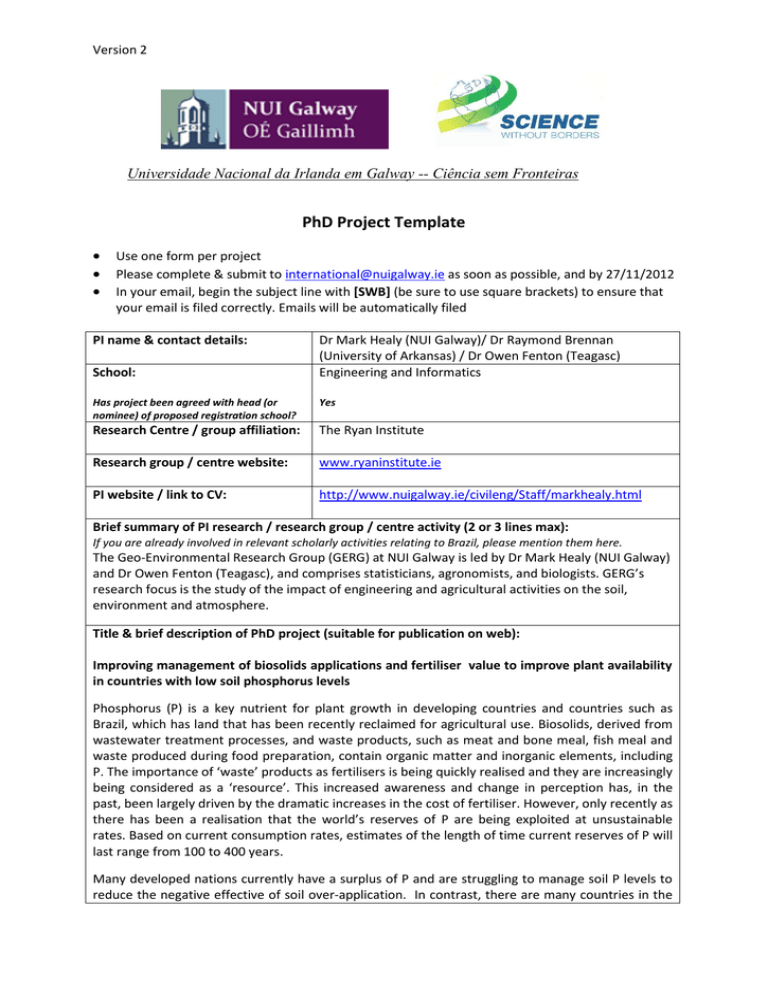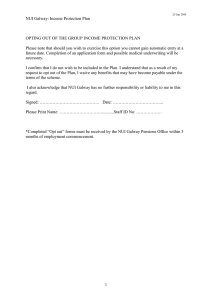PhD Project Template
advertisement

Version 2 Universidade Nacional da Irlanda em Galway -- Ciência sem Fronteiras PhD Project Template Use one form per project Please complete & submit to international@nuigalway.ie as soon as possible, and by 27/11/2012 In your email, begin the subject line with [SWB] (be sure to use square brackets) to ensure that your email is filed correctly. Emails will be automatically filed PI name & contact details: School: Dr Mark Healy (NUI Galway)/ Dr Raymond Brennan (University of Arkansas) / Dr Owen Fenton (Teagasc) Engineering and Informatics Has project been agreed with head (or nominee) of proposed registration school? Yes Research Centre / group affiliation: The Ryan Institute Research group / centre website: www.ryaninstitute.ie PI website / link to CV: http://www.nuigalway.ie/civileng/Staff/markhealy.html Brief summary of PI research / research group / centre activity (2 or 3 lines max): If you are already involved in relevant scholarly activities relating to Brazil, please mention them here. The Geo-Environmental Research Group (GERG) at NUI Galway is led by Dr Mark Healy (NUI Galway) and Dr Owen Fenton (Teagasc), and comprises statisticians, agronomists, and biologists. GERG’s research focus is the study of the impact of engineering and agricultural activities on the soil, environment and atmosphere. Title & brief description of PhD project (suitable for publication on web): Improving management of biosolids applications and fertiliser value to improve plant availability in countries with low soil phosphorus levels Phosphorus (P) is a key nutrient for plant growth in developing countries and countries such as Brazil, which has land that has been recently reclaimed for agricultural use. Biosolids, derived from wastewater treatment processes, and waste products, such as meat and bone meal, fish meal and waste produced during food preparation, contain organic matter and inorganic elements, including P. The importance of ‘waste’ products as fertilisers is being quickly realised and they are increasingly being considered as a ‘resource’. This increased awareness and change in perception has, in the past, been largely driven by the dramatic increases in the cost of fertiliser. However, only recently as there has been a realisation that the world’s reserves of P are being exploited at unsustainable rates. Based on current consumption rates, estimates of the length of time current reserves of P will last range from 100 to 400 years. Many developed nations currently have a surplus of P and are struggling to manage soil P levels to reduce the negative effective of soil over-application. In contrast, there are many countries in the Version 2 Universidade Nacional da Irlanda em Galway -- Ciência sem Fronteiras world that have a P deficit. This imbalance will need to be addressed in order to meet growing demand for food worldwide with increases in population. Researchers in GERG have examined the land application of biosolids to soil and found that different types of biosolids had different impacts on the amount of P that was available for plants to grow. This project aims to identify the wastewater treatment systems which improve the plant availability of phosphorus and to identify soils in which biosolids are most effective. Tests will be initially conducted at bench scale, but would subsequently be conducted at field-scale. The results of this study would help inform policy on suitable application rates to be applied, and on the implication of spreading rates on plant available nutrients. Tasks involved: Working as part of a research team. Literature search. Characterisation of biosolids and soils. Application of biosolids to soil at bench and plot scale. Soil tests such as Morgan’s P, Mehlich P, etc. would be conducted. Unique selling points of PhD project in NUI Galway: NUI Galway projects should emphasise features that are not typically available in Brazil – specific equipment, multi-disciplinarity, aspects of structured programme, links with industry, placements, links with other research groups etc. This project would allow the successful candidate the opportunity to work as part a multidisciplinary group within NUI Galway’s environmental engineering facility, which has links in Australia, USA, Finland, France, the UK, and Brazil. The Civil and Environmental Engineering Laboratory, constructed in 2011 at NUI Galway, is a state-of-the-art laboratory and is amongst the most pre-eminent laboratories of its type in Ireland. It is located in the largest engineering building in Ireland. The laboratory has state-of-the-art environmental water quality measurement, microbiological, and gas measurement facilities. GERG is also closely affiliated with Teagasc, Johnstown Castle, which is Ireland’s leading research institute on the rural environment, and which conducts both fundamental and applied research on a wide range of subjects, e.g. nutrient efficiency, water quality. Name & contact details for project queries, if different from PI named above: Please indicate the graduates of which disciplines that should apply: Graduates with a background in Civil/Environmental Engineering, or any natural science subject (geology, chemistry, hydrogeology) should apply. Training will be provided by the project supervisor. Ciência sem Fronteiras / Science Without Borders Priority Area: Please indicate the specific programme priority area under which the proposed PhD project fits- choose only one (tick box): Engineering and other technological areas x Please indicate which of the following applies to this project (referring to Science Without Borders arrangements): Suitable only as a Full PhD (Y/N): _ _Y_ Available to candidates seeking a Sandwich PhD arrangement (Y/N): _Y__ Suitable for either/Don’t know: __Y__

